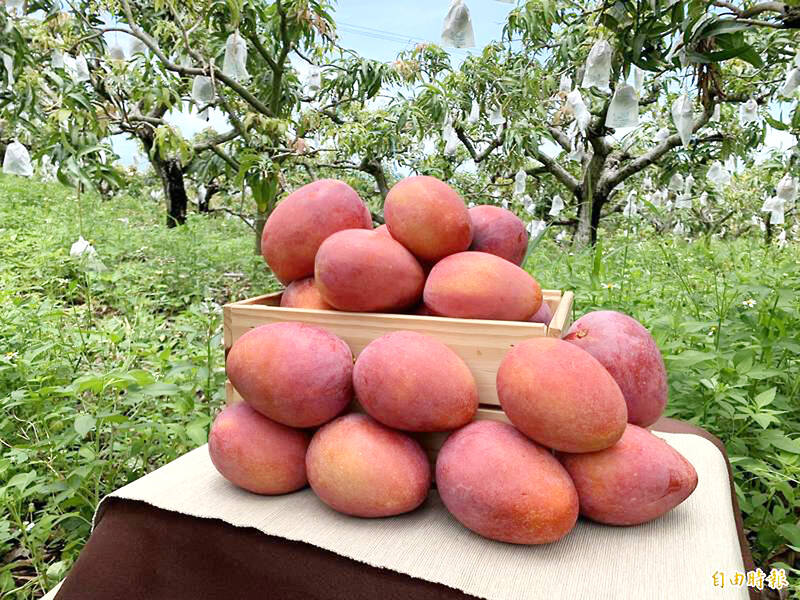Following China’s announcement earlier yesterday that it had suspended imports of mangoes from Taiwan with immediate effect, the Ministry of Agriculture said it would take up the matter with the WTO’s Sanitary and Phytosanitary Measures (SPS) Committee.
China’s Taiwan Affairs Office spokesperson Zhu Fenglian (朱鳳蓮) said in Beijing that Chinese customs officers had detected citrus mealybugs in mangoes from Taiwan, which she said pose a “severe threat” to China’s agricultural and ecological security.
Chinese officials informed Taiwan of the decision via official channels set out in a cross-strait agreement governing quarantine inspections for agricultural products, Chinese state media reported.

Photo: Taipei Times
“The above-mentioned measures are normal biosafety precautions, scientific and reasonable, and comply with relevant mainland laws, regulations and standards,” the office said.
In Taipei, the agriculture ministry criticized the suspension as unwarranted and out of step with international trade standards. It said it had not received any such complaints from other export destinations.
The ministry “deeply regrets that China has repeatedly violated international practices and arbitrarily interrupted trade without scientific dialogue,” it said in a statement.
Deputy Minister of Agriculture Chen Junne-jih (陳駿季) said that China notified the ministry on June 15 and Aug. 3 that it had detected citrus mealybugs in shipments of mangoes from Taiwan.
The ministry then traced the shipments back to their source farms, and told Chinese officials on July 4 and on Thursday last week what steps were being taken to resolve the issue, he said.
The two cases are the only times Beijing has said citrus mealybugs had been found in the 5,689 mango shipments Taiwan has exported to China since 2018, Chen said.
The low detection rate and that China did not take steps to mitigate trade impacts — such as fumigating for citrus mealybugs — as recommended by the WTO, show that Beijing’s decision was “overly harsh” and out of line with international norms, Chen said, adding that the ministry would take the case to the WTO’s SPS Committee.
The suspension from China is unlikely to have major economic repercussions, he said.
Taiwan produced 174,000 tonnes of mangoes this year, of which only 4,000 tonnes, or 2.2 percent, were exported abroad, Chen said.
This year, China imported about 1,000 tonnes of Taiwan mangoes, while Japan and South Korea imported 700 and 600 tonnes respectively, he said.
Taiwan has complained for the past three years of Chinese import bans on agricultural and aquatic goods, including pineapples and grouper fish, saying they are part of a Chinese pressure campaign.
The latest announcement was made a few days after Vice President William Lai (賴清德) returned from a visit to Paraguay that included stopovers in the US.

CHAOS: Iranians took to the streets playing celebratory music after reports of Khamenei’s death on Saturday, while mourners also gathered in Tehran yesterday Iranian Supreme Leader Ayatollah Ali Khamenei was killed in a major attack on Iran launched by Israel and the US, throwing the future of the Islamic republic into doubt and raising the risk of regional instability. Iranian state television and the state-run IRNA news agency announced the 86-year-old’s death early yesterday. US President Donald Trump said it gave Iranians their “greatest chance” to “take back” their country. The announcements came after a joint US and Israeli aerial bombardment that targeted Iranian military and governmental sites. Trump said the “heavy and pinpoint bombing” would continue through the week or as long

TRUST: The KMT said it respected the US’ timing and considerations, and hoped it would continue to honor its commitments to helping Taiwan bolster its defenses and deterrence US President Donald Trump is delaying a multibillion-dollar arms sale to Taiwan to ensure his visit to Beijing is successful, a New York Times report said. The weapons sales package has stalled in the US Department of State, the report said, citing US officials it did not identify. The White House has told agencies not to push forward ahead of Trump’s meeting with Chinese President Xi Jinping (習近平), it said. The two last month held a phone call to discuss trade and geopolitical flashpoints ahead of the summit. Xi raised the Taiwan issue and urged the US to handle arms sales to

BIG SPENDERS: Foreign investors bought the most Taiwan equities since 2005, signaling confidence that an AI boom would continue to benefit chipmakers Taiwan Semiconductor Manufacturing Co’s (TSMC, 台積電) market capitalization swelled to US$2 trillion for the first time following a 4.25 percent rally in its American depositary receipts (ADR) overnight, putting the world’s biggest contract chipmaker sixth on the list of the world’s biggest companies by market capitalization, just behind Amazon.com Inc. The site CompaniesMarketcap.com ranked TSMC ahead of Saudi Aramco and Meta Platforms Inc. The Taiwanese company’s ADRs on Tuesday surged to US$385.75 on the New York Stock Exchange, as strong demand for artificial intelligence (AI) applications led to chip supply constraints and boost revenue growth to record-breaking levels. Each TSMC ADR represents

Pro-democracy media tycoon Jimmy Lai’s (黎智英) fraud conviction and prison sentence were yesterday overturned by a Hong Kong court, in a surprise legal decision that comes soon after Lai was jailed for 20 years on a separate national security charge. Judges Jeremy Poon (潘兆初), Anthea Pang (彭寶琴) and Derek Pang (彭偉昌) said in the judgement that they allowed the appeal from Lai, and another defendant in the case, to proceed, as a lower court judge had “erred.” “The Court of Appeal gave them leave to appeal against their conviction, allowed their appeals, quashed the convictions and set aside the sentences,” the judges